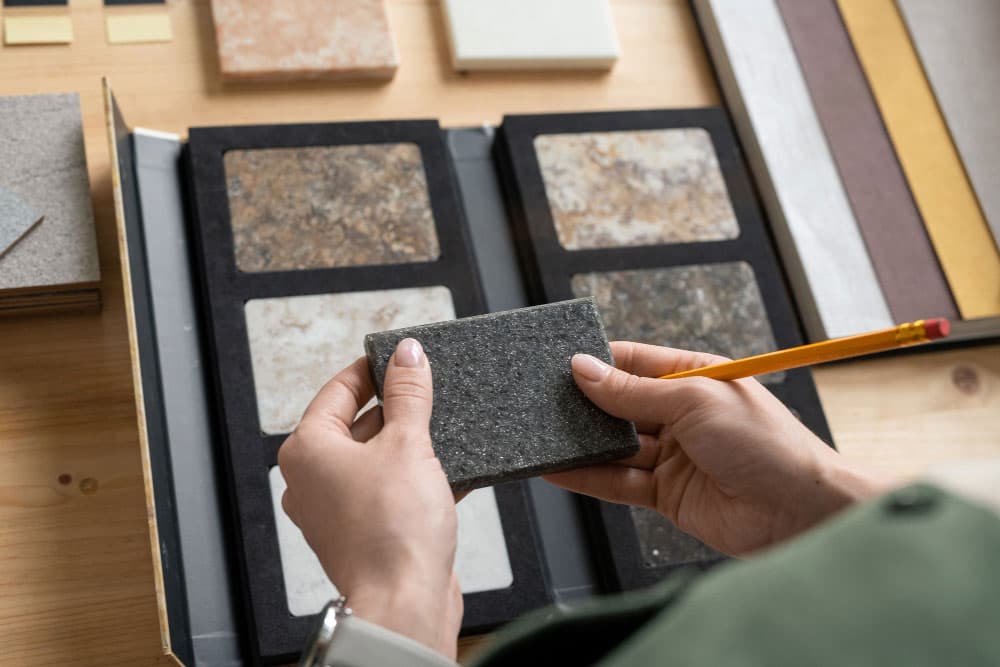
Table of Contents
Granite quality check is important for buying the best quality product. Everyone loves the elegance granite brings to any interior space. Granite is a smart choice as a natural stone, but it comes at a cost. To ensure the best return on investment, it’s important to choose top-quality granite.
Beautiful and versatile, this stone is one of the most admired natural stones and is a top choice among builders, architects, and designers. Beyond its attractive appearance, premium granite stone offers exceptional durability and adaptability.
Granite is a wise investment for both residential and commercial projects. Therefore, understanding the granite quality check process for checking granite quality is essential reading if you’re building a home or constructing a commercial complex.
Easy Tips on Best Quality Granite Identification
How do you check the quality of granite?
It is not possible to determine the precise granite quality check by appearance or feel alone. That’s why it’s important to conduct a proper quality check before purchasing. Otherwise, you may miss out on the real-life benefits granite offers.
1. Visual Inspection is the Priority Granite Quality Test

How to check granite stone quality with visual inspection? If you look at a high-quality granite stone, you will notice the following features:
- The best quality granite has uniform colour and texture. Consistent colour and evenly distributed grains are key indicators of superior quality.
- Premium-grade granite features a smooth, polished finish with no rough patches on the surface.
- Good-quality granite will not show any uneven patterns, cracks, or dents.
2. Water Absorption Test: Easy Granite Quality Test at Home

Granite quality check by water absorption test is a simple method. You can check the porosity of a granite stone, and it is one of the most straightforward quality tests you can do anywhere you wish without any prior preparation.
How to check granite quality by water absorption? In this granite quality check process, you have to pour some water on the granite stone. If it absorbs the water quickly, the stone is highly porous and may catch stains unusually fast. Premium-quality granite stone is not quick to absorb water and fluids and, therefore, is stain-resistant.
3. The Scratch Test: Easy Tips for Conducting a Granite Quality Check

Despite its high price, homeowners, architects, and builders prefer granite because of its durability and scratch-resistant features. However, not all granites are created equal. A simple scratch test as Granite quality check method can help you choose the best granite.
How to perform the granite scratch test as granite quality check?
Take a steel knife and gently try scratching the surface of the granite. If the surface gets scratched, the stone is of inferior quality. Premium-quality granite resists minor scratches and provides excellent durability.
4. The Acid Test: A Reliable Way to Check Granite’s Chemical Resistance

How to check granite stone quality at home? Premium-quality granite is a stunning natural stone that can withstand the abrasiveness of acids. Its acid resistance makes it an ideal choice for heavy-duty residential kitchen countertops and food preparation counters in commercial establishments.
You can perform a simple granite quality check using simple ingredients like lemon juice or white vinegar. Any discolouration of the stony granite surface after coming in contact with these substances indicates lower quality. Mild citrus acids or the acetic acid in vinegar will not affect premium-quality granite.
5. Thickness and Weight of the Granite

Always check the thickness of the granite before buying because it is a crucial factor besides its aesthetics.
A natural granite stone with greater thickness offers better durability and increased functionality and impacts the installation cost. Thicker granite stone slabs are more resilient and can withstand weight and stress, while thinner slabs may require additional support to minimise the risk of cracking or chipping.
That said, sleek granite slabs are trending for their aesthetic appeal and compatibility with modern décor.
6. Easy Sound Test to Check Granite Quality

How to check quality of granite at home? One easy way to check granite quality is a sound test. This granite quality check method requires no special knowledge of granite and can be done anytime.
Gently tap the granite slab with a metal object. Premium-quality granite will produce a resounding buzz or a clear ringing sound, while low-quality stone will produce a dull, flat sound.
All the granite quality check tests described here are simple and easy to perform before buying. If you want to learn howto identify original granite, these tests will help you distinguish between premium and compromised-quality granite stones.
Natural vs. Artificial Granite: Advantages of Natural Granite Stone


Understanding the difference between natural and artificial granite is important because man-made or artificial granite stones cannot match the unique benefits of natural granite. Learning about the key advantages of natural granite stone can help you make an informed buying decision.
- Scratching & Chipping Resistance: Granite is naturally rock-hard. Its durable surface is resistant to scratches and chipping, maintaining its original sheen over time. This ultra-strong durability is one of the standout benefits of natural granite.
- Easy to Clean and Maintain: Natural granite is extremely easy to clean. With just a mild soapy liquid and a paper towel or a soft cotton cloth, you can clean the surface quickly, no matter how dirty it gets.
- Granite is Stain, Moisture, and Heat Resistant: Natural granite resists stains, moisture, and heat. A premium-quality granite stone can withstand staining, chipping, and thermal impact. Despite its natural porosity, it remains highly moisture resistant.
- Antibacterial Properties: When properly sealed, natural granite can resist bacteria and other microorganisms, making it a safe and hygienic option for kitchens and other spaces.
Artificial or man-made granite is less durable and completely non-porous compared to natural granite. It lacks the organic, natural appearance of real stone. While natural granite is a solid stone, artificial granite is a composite made of crushed stone and resin. It may look like stone, but it isn’t truly stone in the traditional sense.
Apart from the quality check tests, check the country of origin. Grade-1 or commercial-grade granite is imported from China, while middle-to high-grade granite is sourced from India, Norway and Brazil.
Once you have chosen the granite that catches your eye, don’t stop—test it to ensure you’ve truly found the best with the above-mentioned granite quality check methods. After all, building a home is a once-in-a-lifetime experience, and every choice you make should reflect quality and value. Don’t let a lack of information keep you from investing in what’s best for your home.
Also Read: 10 Various Uses of Granite in Your Home
FAQs on How to Check Granite Quality
1. How to Check If a Granite is Original or Fake?
It is simple to verify if a granite stone is natural or man-made by testing its porosity. Natural granite is porous—any water spilt on its surface will be absorbed into the stone. On the other hand, man-made granite is non-porous and will not absorb water.
2. What Are the Levels of Granite Quality?
Granite grades are commonly categorised into three primary levels: Level 1 (Entry Level), Level 2 (Mid-Grade), and Level 3+ (High-Grade). These grades provide a framework for differentiating between different levels of quality, appearance, and durability in granite slabs.
3. How to Care for Granite?
Caring for granite is simple. Clean spills promptly with a soft cloth and a pH-balanced cleaner that’s safe for natural stone. Avoid harsh or acidic cleaners, as they can damage the surface. Regularly apply a sealant to protect against stains. You should always blot spills rather than wiping them to prevent spreading and use coasters under glasses or cups to avoid surface damage.
4. How To Identify the Quality of Granite?
The thickness of granite slabs is a crucial factor in validating their quality and durability. High-quality granite typically has a minimum thickness of 18mm. Thicker slabs are not only good-looking but also contribute to enhancing the stone’s strength and longevity, making it more resistant to cracking or chipping.
References
Xinghui Wu Qifeng Guo, Yu Zhu, Fenhua Ren, Jie Zhang, Xu Wu, Meifeng Cai. (2021) in Pore structure and crack characteristics in high-temperature granite under water-cooling from Case Studies in Thermal Engineering, Volume 28, December 2021, 101646 https://doi.org/10.1016/j.csite.2021.101646) Available from: https://www.sciencedirect.com/science/article/pii/S2214157X21008091
Andor Németh Ákos Antal, Ákos Török, (2021), in Appl. Sci. 2021, 11(19), 8792; https://doi.org/10.3390/app11198792, Available from: https://www.mdpi.com/2076-3417/11/19/8792






























